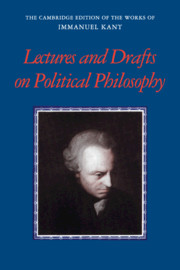Book contents
- Frontmatter
- Contents
- General Editors’ Preface
- Acknowledgments
- General Introduction
- Translators’ Remarks
- Reflections on the Philosophy of Right
- Natural Right Course Lecture Notes by Feyerabend
- Drafts for Published Works
- Drafts for Theory and Practice
- Drafts for Towards Perpetual Peace
- Drafts for the Metaphysics of Morals
- Drafts for Conflict of the Faculties
- Glossary
- Topical and Chronological Concordance
- Editorial Notes
- Index
Drafts for Towards perpetual peace
Published online by Cambridge University Press: 10 December 2020
- Frontmatter
- Contents
- General Editors’ Preface
- Acknowledgments
- General Introduction
- Translators’ Remarks
- Reflections on the Philosophy of Right
- Natural Right Course Lecture Notes by Feyerabend
- Drafts for Published Works
- Drafts for Theory and Practice
- Drafts for Towards Perpetual Peace
- Drafts for the Metaphysics of Morals
- Drafts for Conflict of the Faculties
- Glossary
- Topical and Chronological Concordance
- Editorial Notes
- Index
Summary
Loses Blatt F 13. This loose sheet also contains R8100 (19:642–43) on determinism and religion and R159 (15:57) on anthropology, both dated 1794–95. This passage appears after R8100 and before R159.
[first page]
Of Perpetual Peace.Means for it. 1) Do not retain old claims. 2) Do not conquer any independent countries. 3) Do not maintain standing armies (perpetuus miles). 4) Do not accumulate a treasury. 5)Do not create any national debt. – These are negative means. Positive 5 every state reforms itself.
Here the practical ones [say] that one can become prudent through experience alone and consider the way things are always done as real and expedient; for those who thinkmetaphysics is vain theory and empty dreaming are in possession of the principles means that the world can use for perpetual peace; still they must consider this dreaming with peaceful hearts, and as something which has absolutely no influence on business people, and they draw attention to the schools. – Play with ideas.
The metaphysician, who in his sanguine hopes to improve the world will always be juggling ten balls (i.e. doing the impossible),will be viewed with a shrug of the shoulders. Harrington's Oceana.
Loses Blatt F 20. This appears to be a draft of the footnote on 8:347–48.
Objective practical necessity to act in a certain way (to do or to refrain from doing) as long as it does not contradict the laws, that is, can be thought merely as possible not as necessary; consequently a permissive law, a necessity of the contingent in accordance with laws, that, if they are laws of reason and the permitted action. But if it is considered merely as not forbidden (as permitted) consequently also not as necessitated, then the action conceived this way is not thought as standing under that practical necessity and the concept of a permissive law of pure reason contains a contradiction if freedom, which in this case is not restricted by any law, is yet at the same time represented as something that needed to be restricted through a law.
Information
- Type
- Chapter
- Information
- Kant: Lectures and Drafts on Political Philosophy , pp. 207 - 226Publisher: Cambridge University PressPrint publication year: 2016
